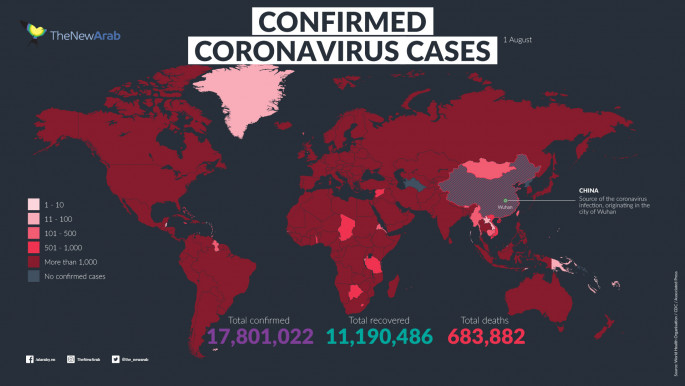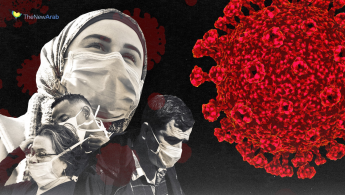The Middle East at war with coronavirus: Top stories from 5 July
Five stories you need to know about the coronavirus pandemic and how it is affecting the Middle East on July 5.
1. Top Egyptian actor Ragaa al-Geddawy dies from Covid-19
Famed Egyptian actor Ragaa al-Geddawy died on Sunday after contracting the Covid-19 disease, the actor's union said. She was 81.
"Ragaa al-Geddawy passed away this morning due to COVID-19," union head Ashraf Zaki told AFP.
"No public funeral was arranged for health reasons."
Geddawy tested positive for the illness caused by the novel coronavirus in late May and was treated in isolation at a hospital in Ismailia province, some 130 kilometres (80 miles) east of Cairo, local media reported.
She had recently finished filming for her latest TV series "Laabet El Nesyan" (Oblivion Game), which aired during the Islamic holy month of Ramadan.
A veteran actor, Geddawy boasted a lengthy and varied career during which she gained fame across the Arab world. Read more here.
2. Iran reports new record one-day virus death toll
Twitter Post
|
Iranian health authorities on Sunday announced 163 new deaths due to the Covid-19 disease, the country's highest official one-day toll since the outbreak began in February.
The previous record of 162 deaths was announced on Monday in the Islamic republic, which has been battling the Middle East's deadliest outbreak of the novel coronavirus.
The new deaths bring the total toll in Iran to 11,571, health ministry spokeswoman Sima Sadat Lari said on state television.
"In the past 24 hours, 2,560 people have tested positive for coronavirus, bringing the total number of infections to 240,438," Lari added.
Official figures have shown a rising trajectory in fatalities and new confirmed cases since Iran reported a near-two month low in daily recorded infections in early May.
The increase has prompted the government to make the wearing of masks mandatory in enclosed public spaces, with some officials and state television anchors wearing masks on camera as part of a campaign to encourage their use. Read more here.
3. Saudi Arabia, UAE see spike in coronavirus cases after lifting curfew
Saudi Arabia's coronavirus infections surpassed 200,000 cases, while the UAE has recorded a total of 50,000 infections. The numbers reportedly climbed after the two Gulf countries lifted curfews last month.
Restrictions curbing the spread of the virus had been in place in both countries since mid-March, Reuters reported on Sunday, while gradual easing of measures has allowed businesses to reopen.
Other Gulf countries Qatar, Bahrain and Oman did not impose a curfew, while Kuwait has maintained a partial one, according to Reuters.
Saudi Arabia has the highest number of cases among all Gulf states, adding up to a total of 201,801 infections which have resulted in 1802 deaths, according to the latest situation report released by the WHO. The Kingdom reportedly recorded an additional 4,100 cases on Friday and Saturday. Read more here.
 |
| Click to enlarge |
4. Morocco reports record daily number of coronavirus infections
Morocco reported 698 additional novel coronavirus infections on Sunday, the highest one-day increase since the outbreak began in early March, with numerous cases discovered in a port city factory.
The new figures bring the official total in the North African kingdom to 14,132 infections and 234 deaths, according to the health ministry.
The majority of the new infections were detected in a fish canning factory in the southern port city of Safi.
The city was quarantined overnight Saturday to Sunday and its roughly 300,000 inhabitants placed under a total lockdown, media reports on Sunday quoted local authorities as saying.
Morocco, with a population of around 35 million, eased virus-related restrictions on June 25, reopening cafes, restaurants, hotels and sports halls. It also allowed domestic tourism and inter-city travel. Read more here.
5. Kazakhstan imposes 'second wave' of restrictions as coronavirus surges
Kazakhstan on Sunday imposed a second round of nationwide restrictions to counter a huge surge in coronavirus cases since the previous lockdown, which has overwhelmed the oil-rich country's healthcare system.
Shopping centres, gyms, swimming pools, hairdressers and beauty salons have all closed down for the next two weeks, a measure that authorities may choose to extend.
An AFP correspondent saw long queues outside pharmacies in the country's largest city Almaty, where demand for medicines such as paracetamol has far outstripped supply.
Yevgeny Yermin was waiting to buy medicines for his 76-year-old mother, who has coronavirus symptoms.
He said that he had not taken the virus seriously until it hit his own family.
"A week ago we lost our grandfather (to the coronavirus). We thought it was all some sort of a joke. Turns out it isn't a joke at all," Yermin told AFP.
Kazakhstan imposed a strict lockdown in late March that saw important sectors of the economy grind to a halt and prevented most travel.
But it was one of the first Central Asian countries to lift restrictions in late May, when it had less than 9,000 confirmed cases.
Since then however, coronavirus cases have risen more than five-fold, reaching over 47,000 with 188 fatalities.
Follow us on Facebook, Twitter and Instagram to stay connected





 Follow the Middle East's top stories in English at The New Arab on Google News
Follow the Middle East's top stories in English at The New Arab on Google News
![Israeli forces ordered bombed Gaza's Jabalia, ordering residents to leave [Getty]](/sites/default/files/styles/image_330x185/public/2176418030.jpeg?h=a5f2f23a&itok=_YGZaP1z)

